
|
|
 |
|
![]()
As they comb through the city's houses, search teams of American and Iraqi soldiers have discovered much larger supplies of weapons than they expected, and the need to detonate them safely could delay initial reconstruction efforts under way here, officials said. Explosions can be heard throughout the day as munitions teams detonate the weapons in a quarry north of the city, but some are too dangerous and must be blown up in place.
"We knew there would be ordnance," said Lt. General Richard Natonski, the Marine commander who planned the American strike here, "but what we found exceeded our wildest expectations."
General Natonski took a tour of the Janabi mosque several hours after it was discovered this morning by a company of marines from the Third Battalion, Fifth Regiment. The mosque, in a residential area just north of the main east-west artery known as Highway 10, included at least a dozen brick outbuildings packed with bombs, guns, rocket-propelled grenades, and ammunition. The diversity of the weapons surprised the officers here: in the street outside, a ship mine stood in a puddle.
Just inside the mosque compound was an aluminum shed full of mortars and TNT. Like many weapons depots in Falluja, it had been wired to explode, and had to be carefully dismantled by an American explosives team. Inside the compound was a document explaining how to destroy tanks using rocket-propelled grenades. General Natonski picked up a white pilot's helmet among the mortars and gazed wonderingly at it.
"Did you find any Darth Vader helmets?" he asked the marine captain next to him.
| In the mosque caretaker's hut, there
were boxes of mortars and bullets, and signs of a life hastily abandoned. A
refrigerator stood in the corner, its door open, with eggs and bottles of
water visible.
Maj Gen Richard Natonski, commander of the 1st Marine Division said militants were using mosques as a base for operations. "In almost every single mosque in Fallujah we have found an arms cache. We've been shot at by snipers from minarets."
|
 |

This is
your last chance, Fallujah rebels are told as US prepares
ground attack
By Toby Harnden in Ramadi
(Filed: 29/10/2004)
Iraq's government yesterday offered the leaders of rebel-held Fallujah a "last" chance to negotiate as an American military commander described the city as a cancer that had to be dealt with.
Iyad Allawi, the Iraqi prime minister, indicated that time was fast running out for those who were harbouring insurgents there.
"This chance could be the last," he said in a statement, imploring "the leaders and notables of Fallujah to use it to find a political solution".
But with military preparations at an advanced stage and American officials suggesting a major offensive could begin next week, there appeared little hope of a deal.
"Fallujah is a cancer," said Maj Gen Richard Natonski, commander of the 1st Marine Division, who would lead any ground attack. "We can't have a sanctuary for the enemy and expect to make progress."
He said he had received no request from the Iraqi government to carry out military operations and offered no opinion on whether a peaceful solution was possible. "I don't know who they're negotiating with."
But he made clear that his men were ready for action in Fallujah. "It's a rats' nest but if we have to go in and clear it out we will." He urged the foreign elements in Fallujah and those loyal to Saddam Hussein's regime to come out and fight.
"We can take these guys on if they show their faces. Not a problem whatsoever
· Most Poles felt that GROM Commander Col. Roman Polko was punitively recalled to Warsaw for allowing himself and his men to be photographed by a news photographer. Few believed the government’s explanation that had returned in the middle of a war “to complete his post-graduate studies”.
· US Brigadier General Rich Natoński, the Polish-American commander of the Marine Task Force Tarawa which had liberated the city of Amarah, encountered a typical Iraqi reaction when the local Shiite sheik told him that “the Americans do not know what’s best for Iraq, only Iraqis do.” Natoński assured local leaders that American soldiers “also want to go home also to their families.”
· The Polish-American Brigadier General Rich Natoński told reporters he had had a 12-year-old girl, shot in the head during the siege, evacuated by helicopter after his medics had treated her.
 |
 |
 |
|
|
|
|
|
|
||
|
||
CPU seconds used 0 |
|
|
|
||||
|
Blackwater supplies Mercenaries
These guys recruit Seals and Army Rangers - pay them $ 200,000 a yr |
|
|
| Blackwater, a security and training company based in Moyock, N.C., prides itself on the high caliber of its personnel, many of whom are former U.S. Navy SEALs. It has 450 employees in Iraq, many of them providing security to CPA employees, including the U.S. administrator, L. Paul Bremer, and to VIPs visiting Iraq. |
 |
|
|
|
The Blackwater mission was to provide security for trucks belonging to a food caterer, ESS. The empty trucks were being sent to pick up kitchen equipment from the 82nd Airborne. But the Blackwater men were uneasy. One team member, former Army Ranger Wes Batalona, complained to a friend that the team had never worked together before. And contractually, Blackwater was to supply two SUVs with three guards per vehicle. Instead, the men set out that morning with just two men per car, each short a rear gunner.
After the killings, concerns mounted about the regulation and accountability of private security companies. In a case that is being closely watched by contractors, the families of the men filed wrongful death lawsuits against Blackwater in January 2005. The suits charge Blackwater "knowingly and intentionally" sent the men out "without the needed and promised protections" such as equipment, personnel and maps (read the lawsuit, PDF file).
But in a privatized war,it's hard to determine who can be held responsible; disentangling the chain of contracts behind the mission is difficult and has so far obscured any final accountability. Blackwater denies responsibility for the contractors' deaths and says it doesn't know who directed the March 31st mission. Blackwater was contracted through a Kuwaiti company, Regency, to a Cypriot company, ESS, the food caterer. ESS has refused to tell FRONTLINE exactly whom they were working for.
On this second anniversary of the siege of Fallujah, the families of the four Blackwater contractors, whose ambush led to the Fallujah invasion, have filed a ground breaking lawsuit.
Scott Helvenston was getting paid $600 a day. Blackwater, in turn, was billing a Kuwaiti company more than $800 for Scott Helvenston's services, and then that Kuwaiti company, in turn, billed a Cypriot company called E.S.S., which was the company that provides catering services to military operations, basically the U.S. military bases. And then the reports are that E.S.S. had a contract with Halliburton -- with K.B.R., the subsidiary of Halliburton. K.B.R. has denied any relationship to this and won't talk about it anymore. But it just shows sort of the breakdown. It goes through multiple hands, at least three or four layers per contract.
And so, in that whole pyramid scheme, what you saw was Blackwater had a subcontract with this Kuwaiti company, and the Kuwaiti company had the contract with E.S.S., so the contract with E.S.S., the company that provides the catering services, said explicitly because there is *a very serious security situation in Fallujah -- it actually names Fallujah as one of the cities -- these men need to be traveling in armored vehicles. And it goes through all the other ones. There should be three men per team. Well, Blackwater then, when they cut their subcontract with this Kuwaiti company for this deal, kept intact the entire part of the contract that went over the security provisions, except for one word: armored. They deleted the word "armored". And Marc Miles says that in doing that, Blackwater was able to save $1.5 million."
And so, what happened that particular day from the evidence that I've accumulated is that they were basically told to escort three flatbed trucks, which I understand were going to pick up some kitchen equipment, far different from what Scott Helvenston had been told, that he would be guarding an ambassador. Instead, kitchen equipment, actually empty trucks that were going to get kitchen equipment.
So they were to escort these two E.S.S. trucks from a city of Taji to an army base, which is on the west side of Fallujah. And so, what happened is they set out on their mission, but because they didn't have G.P.S., because they didn't have maps of the area, because they weren't able to do a pre-trip inspection of the route, they didn't necessarily know where they were going, so they essentially got lost. And, in fact, the first day that they set out, they were so lost and it was getting late that they ended up staying at an army base on the east side of Fallujah.
From what I understand, and folks that we have talked to, they had asked for a map shortly before going out on their mission, and basically the individual who was in charge of handing out the maps said, "It's too late for a map now," and sent them on their way. And that's the type of conduct at Blackwater that we're dealing with. They got so lost that first day that they had to spend the night in a different camp, somewhere that they weren't even intending on going. And at that point, they were on the east side of Fallujah.
Now, they were ultimately to get to the other side of Fallujah. Unfortunately, what they didn't know was that there was a much safer route that took them around the north side of Fallujah. They could have easily traveled this route in a single day, and it would have been extremely less dangerous. But because they didn't have a map, they didn't have G.P.S., and, in fact, funny story, I think they had G.P.S. units, but Blackwater didn't provide them with the maps to go in the G.P.S. units for the Middle East. So, essentially, they had G.P.S. units for the United States, which doesn't do a lot of good over there. Anyway, there was a safer route that they could take north of the city that would take them about three hours to get to the other side. But instead, they missed that turnoff, and they ended up driving straight through the center of Fallujah, and it was as they got through the middle of town that they got stuck in traffic, that they were ultimately ambushed.



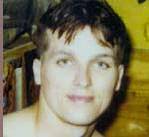

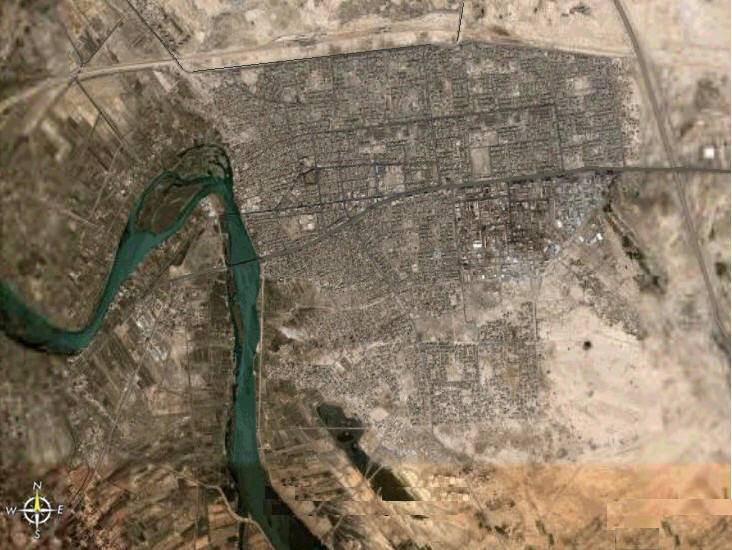


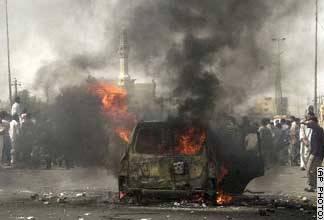


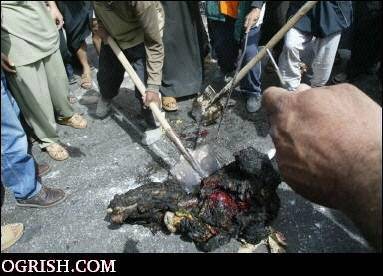

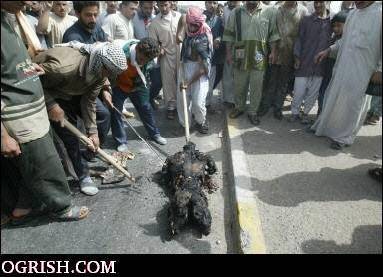
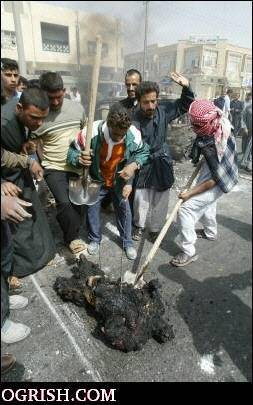
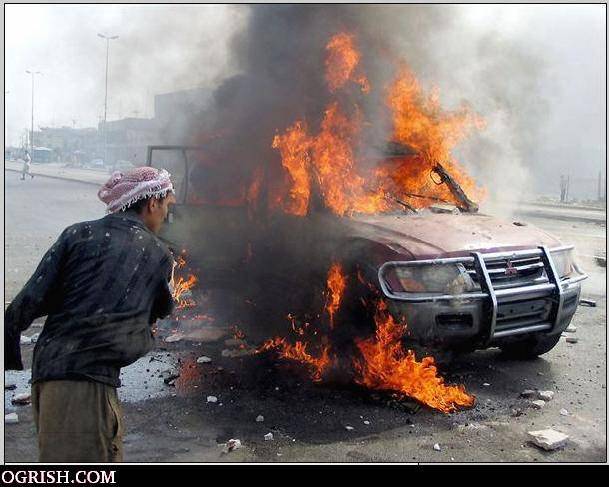


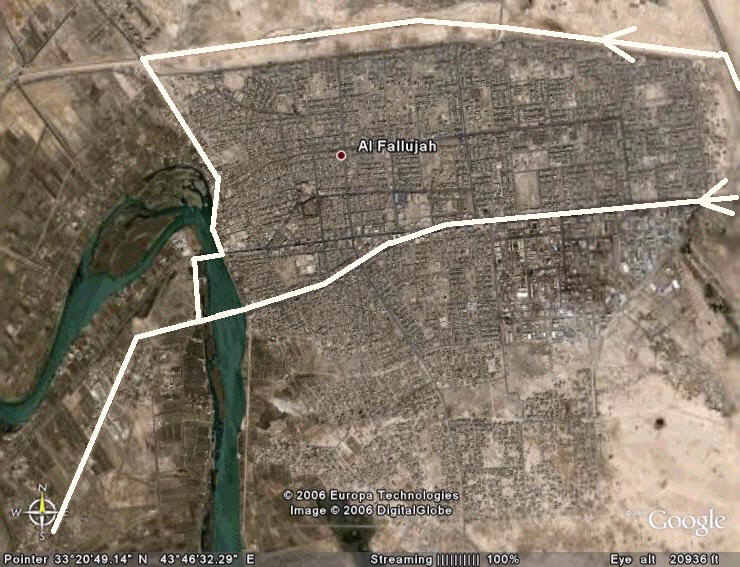
|
||||||
|
||||||